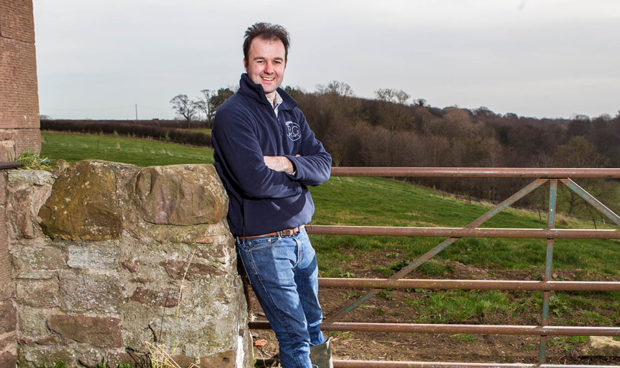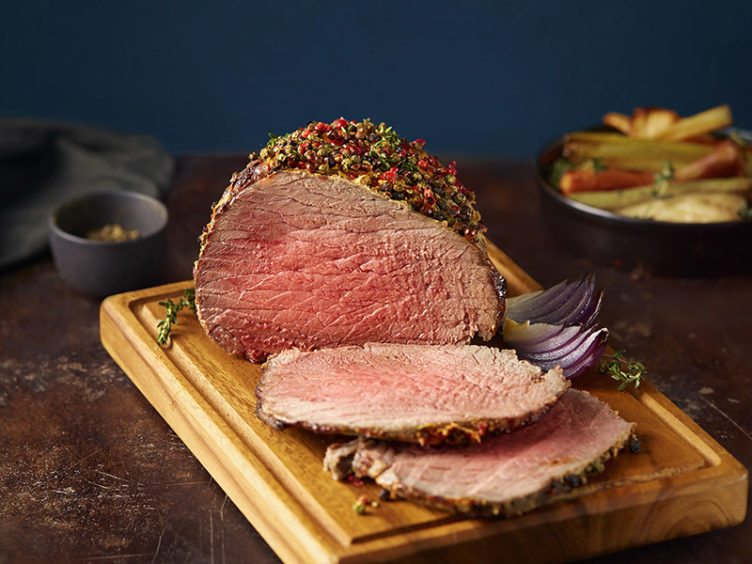
As a brand, Scotch Beef has earned a global reputation for quality and taste, and it is the assurances behind it that are crucial to its success.
Niall Jeffrey who, together with his father, runs the family-owned Bielgrange farm in East Lothian, was recently crowned AgriScot Scotch Beef Farm of the Year.
A fourth-generation farmer, Niall, 33, never doubted his own career path, and though his job is a seven-day-a-week commitment, he wouldn’t have it any other way.
He said: “From a very early age I knew I wanted to be a farmer. I’ve been working with my dad following him around from eight years old, and by the time I finished school I knew that’s what I was doing.
He added: “I did a degree in agriculture at Newcastle University, so I didn’t fall into it by accident.
“I love the sense of completion that comes with the job, the process that takes you full circle.
“Whether it’s raising cattle or planting a crop, looking after it and harvesting it, you’re not doing one part of a job – every year you finish the projects that you start.
“The common perception of farming is of dawn starts, but you can try and make it as close to a nine to five job as possible.
“The biggest thing with livestock production is weekends though, because every Saturday and Sunday morning someone has to muck in.
“I’m lucky enough to have people working for me and we rotate working weekends because animals need looked after every single day. We employ three full-time staff and myself and my dad.”

As a producer of Scotch Beef PGI – the PGI standing for Protected Geographical Indication ensuring all cattle originate from and are reared in Scotland – Niall’s farm is part of an assurance scheme that operates stringent regulations around production and welfare standards.
The scheme is overseen by the public body Quality Meat Scotland (QMS) which is responsible for promoting and developing the Scottish meat industry.
Bielgrange has been a member of the scheme for over 20 years, and Niall believes the standards they adhere to result in a superior product for consumers.
He explained: “We saw membership of the QMS Cattle and Sheep Assurance Scheme as an opportunity to differentiate in the market.
“The more and more I work with QMS, I completely buy into the Scotch Beef brand and the benefit it has to my business.
“In terms of the assurances, the animals are born and raised in Scotland and we need to stick to best practice around animal welfare. We also aim to have a positive environmental impact so the quality of our meat is assured and our production methods are sustainable.
“Animal welfare and wellbeing is a guiding principle of the QMS assurance schemes which are supported and approved by the Scottish SPCA, Scotland’s independent animal welfare charity.
“We have an annual inspection of our accommodation facilities to review where we house the animals in winter. Everything we do is recorded and monitored.
“Our cattle are predominantly grass fed. The idea is to have the animal grow at a steady rate without a period of non-growth throughout the lifetime through a grass diet and a winter diet which is typically straw. If you overfeed early on you end up with muscle fibre and intra-muscular fat being laid down when it doesn’t need it. The way we raise cattle influences the quality of the product.”
The Scotch Beef PGI logo is recognised around the world, and has the export figures to show for it. France is the largest export market for Scotch Beef and Scotch Lamb, with well-established markets in Italy, Belgium and Luxemburg too.
But the biggest increase in export trade of beef from Scotland in the year August 2016 to August 2017, was to Germany and Scandinavia which have increased by 53% and 46% respectively.
According to QMS, the Scottish red meat industry contributes £2 billion to the Scottish economy and supports 50,000 jobs in Scotland. It added that the value of exports of beef and lamb from Scotland increased to over £80 million in the year ending August, 2017, with demand remaining strong despite the challenges presented by Brexit and in the global economy.
And Niall, who lives on the farm with his partner and their three children aged six, five and one, believes the future looks promising because of the reputation Scotch Beef enjoys.
He said: “The brand carries a lot of weight, and people these days are now interested in where foods originate from and how they are produced.
“I try and encourage my children to know where their food comes from, and there’s a great charity, the Rural Highland Education Trust, that does lots of good work in schools and events teaching younger generations about where food comes from.
“It’s never been more important to eat local in this country, and quality always shines through.”
That view is backed by Martin Hollis, executive chef at the Old Course Hotel in St Andrews, where he overseas six dining venues which, when it comes to beef, will only serve Scotch.
Martin said: “We use it because of the consistent quality. We are members of the Scotch Beef Club, and that means we can offer clients proof and traceability right back to the farm. It gives the peace of mind of knowing where the product comes from.
“On the resort we have a range of dining venues at different price points so we’ll use everything from minced beef, chops, hanger steak, fillet, sirloin, rib eye, and even beef lorne sausage at breakfast.
“Across the board, we’ll flag up Scotch Beef on our menus, and that traceability of food is something that’s becoming more important to diners, and it shows them we’re taking care in what we’re doing.”
Scotch Beef Club members, of which there around 200 in the UK, must apply to join and are asked to keep records of the beef they purchase and to identify Scotch Beef on their menus. And, says Martin, this is often a talking point for clients.
He added: “Through the season, we’re a destination venue for a lot of people who come to St Andrews for golf, sometimes as a once-in-a-lifetime experience. At the Road Hole restaurant our clients, many of them Europeans, come up to the pass and tell us they can’t believe the quality of the beef and the product.
“The better restaurants in Europe import Scotch Beef, and there are members of the Scotch Beef Club in France and Spain. We are the envy of the whole of Europe because of our natural produce in Scotland. Scotch Beef is the Rolls-Royce of meat, right up there with other top brands in terms of reputation.”

What’s in a name?
Scotch Beef is renowned across the world for its quality, flavour and high production and welfare values.
The Scotch Beef PGI label on meat products in supermarkets, butcher’s shops and restaurants, signifies it has been sourced only from Scottish farms that meet stringent criteria when it comes to animal welfare, feeds and production standards.
The QMS Animal Welfare Charter is supported by the Scottish SPCA, Scotland’s independent animal welfare charity.
The Scottish SPCA also carries out joint visits to QMS-approved livestock farms along with independent farm assessors.
*Scotch Beef is always traceable, local and quality assured. Look for the label. For more information visit the website by clicking here.

Enjoy the convenience of having The Sunday Post delivered as a digital ePaper straight to your smartphone, tablet or computer.
Subscribe for only £5.49 a month and enjoy all the benefits of the printed paper as a digital replica.
Subscribe